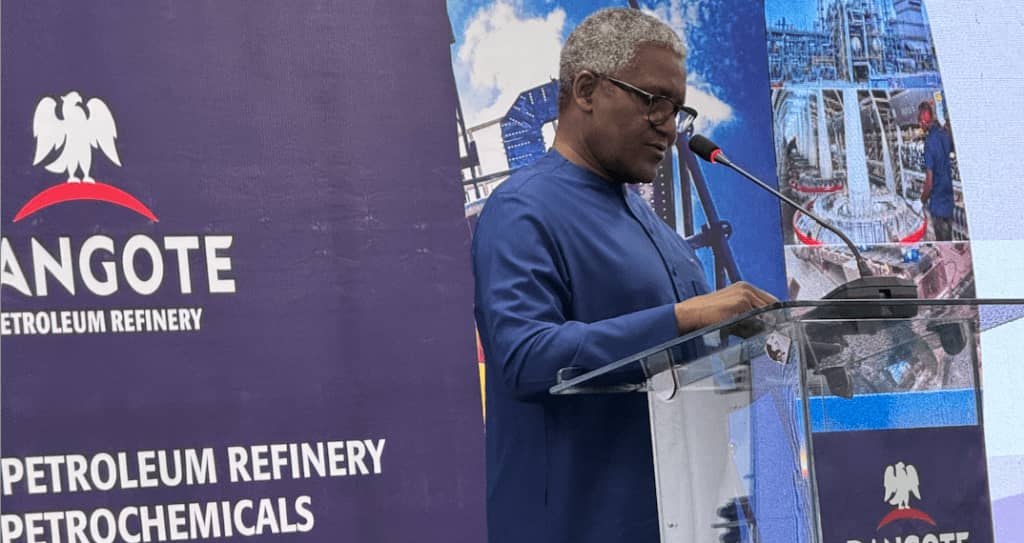Business
Dangote Refinery cuts crude purchases over operational hitches

The Dangote Petroleum Refinery has reportedly scaled back its crude oil intake this month amid operational setbacks that have slowed production, raising concerns over sustained pressure on petrol prices nationwide.
According to tanker-tracking data and cargo allocation lists, the refinery is expected to take in fewer than 300,000 barrels of crude per day in October — a sharp decline of over 50 per cent from its July peak of 600,000 barrels daily.
A Bloomberg report on Thursday suggested the situation could persist into next year, potentially tightening domestic fuel supply and keeping petrol prices elevated.
The report stated, “Nigeria’s huge Dangote oil refinery has been buying a lot less crude lately amid operational setbacks, something analysts say could persist into next year and keep supporting gasoline prices. Dangote is expected to purchase fewer than 300,000 barrels a day of crude this month, according to tanker-tracking data and cargo allocation lists.”
Since commencing operations in 2024, the $20bn Lekki-based complex has reshaped oil trading across West Africa but continues to face technical and labour-related challenges, including unplanned shutdowns and reported acts of sabotage during internal restructuring.
These disruptions, combined with outages in Europe and the Middle East, have contributed to higher global petrol prices in recent months.
Intelligence firm IIR Energy disclosed that the refinery’s gasoline unit has suffered multiple stoppages this year and might undergo another shutdown early next year for major maintenance work.
Analysts at consultancy firms such as FGE NexantECA remain doubtful about the refinery’s ability to sustain high output levels in 2026.
“We think it is likely that Dangote will continue to face issues next year, albeit to a lesser extent than this year,” said Qilin Tam, head of refining at FGE NexantECA.
Unscheduled outages, he added, “could add a bullish sentiment to the gasoline market moving forward,” particularly ahead of the next summer driving season.
According to IIR, the refinery’s residue fluid catalytic cracker unit was scheduled to restart this week after being offline since late August. However, the gasoline-making section still requires significant repairs and may again shut down in January.
“European gasoline has been extremely strong as a result of Dangote’s issues,” said Sparta Commodities analyst Neil Crosby. “At the moment, Dangote’s track record is poor, and if that keeps going, it will be supportive for European gasoline and, to a degree, distillate going forward.”
The Bloomberg report further indicated that 1.5 million barrels of crude feedstock for this month would come from the Nigerian National Petroleum Company Limited under a recently signed naira-for-crude supply deal. A similar volume is expected in November, according to cargo allocations.
Since its July peak, largely driven by increased imports from the United States, Dangote’s crude purchases have slowed — a trend that traders believe reflects reduced operating rates.
Traders also noted that the refinery has not yet placed orders for West Texas Intermediate crude for November delivery, a further signal of weakened demand.
While the plant could still boost purchases through spot deals, Crosby noted that future buying decisions would depend heavily on operational stability.
Wood Mackenzie Ltd. projects that the refinery’s run rates should improve once the current issues are resolved.
However, Alan Gelder, vice president for refining, chemicals, and oil markets at WoodMac, warned that further setbacks could “curb crude runs and lead to a lower-value mix of oil products in place of gasoline.”
That scenario, he said, could push Dangote’s fuel oil exports toward Asian markets and sustain European gasoline flows to West Africa, supporting European refiners.
Available data show that the refinery has so far processed a total of 3.94 million barrels of crude.
A senior executive of Dangote Industries Limited declined to comment on the current status or future plans for the refinery’s main petrol unit.






















